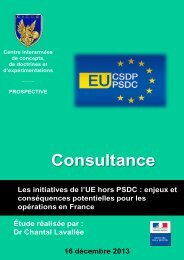Conference
science-research-bulletin-2013-conference
science-research-bulletin-2013-conference
You also want an ePaper? Increase the reach of your titles
YUMPU automatically turns print PDFs into web optimized ePapers that Google loves.
EUROPEAN POLICE SCIENCE AND RESEARCH BULLETIN<br />
SPECIAL CONFERENCE EDITION<br />
ECONOMIC CONSTRAINTS AND AUSTERITY:<br />
CONSEQUENCES FOR POLICE TRAINING AND<br />
EDUCATION — CHALLENGES AND RISKS —<br />
(STIMULUS FOR RESEARCH INITIATIVES)<br />
János Fehérváry<br />
Austria<br />
Keywords: Police training, economic constraints, austerity<br />
Abstract: As a consequence of programmes for consolidation of state finances you can find dramatic<br />
reductions of police training related budget figures in many European countries and in the EU (e.g.<br />
CEPOL). This situation can be seen dangerous for police/policing and at the same time challenging.<br />
The paper presents different measures to overcome<br />
budget cuts, as well as the potential consequences<br />
which are similar in many countries. however with<br />
differences in dimension, extent and direction.<br />
It appears to the author that the economic<br />
constraints should not be seen only as an obstacle<br />
for the further development of police training.<br />
It should be a challenge for all stakeholders<br />
and decision-makers in this field for a thorough<br />
examination of the current system and situation<br />
and for an adaptation of training/education<br />
according to new and changing conditions. This<br />
examination has to respect risks, as they are<br />
seen by experts. Only a few aspects of potential<br />
challenges and risks are described in the paper.<br />
Conclusion and motivation: Austerity programmes<br />
and their consequences for police and police<br />
training necessitate the need of new researchbased<br />
knowledge about how police training with<br />
high quality can be offered to different actors<br />
of policing in spite of dramatic cuts from state<br />
budgets.<br />
According to Cordner & Shaine (2011, p. 281),<br />
“In the twenty-first century, two of the most<br />
powerful contemporary factors affecting police<br />
education and training are globalisation and<br />
the current economic downturn.” The changes<br />
of the economic conditions for police training<br />
and education are subject matters for scientific<br />
considerations (Neyroud, 2011, pp. 156-173) or<br />
police research projects rather rarely up to now.<br />
It is not necessary to have a look only at some<br />
EU Member States like Greece, Portugal, Spain<br />
or Slovenia with very far-reaching austerity<br />
programmes and drastic cuts in fields of civil<br />
service – like police and police training. The<br />
current situation in Europe is marked by dramatic<br />
reductions of police training related budget<br />
figures as consequences of necessary programmes<br />
for consolidation (restoration/overhauling) of state<br />
finances – or austerity programmes – in many<br />
(or even all) European countries and in the EU –<br />
e.g. CEPOL (European Commission, 2013b). This<br />
situation can be seen dangerous for policing and<br />
at the same time challenging.<br />
MEASURES TAKEN TO<br />
OVERCOME BUDGET CUTS AND<br />
CONSEQUENCES<br />
The following measures to overcome the budget<br />
cuts –as well as the potential consequences – are<br />
similar in many countries – however there are<br />
remarkable differences in size, extent and direction<br />
across countries depending on the severity and<br />
128





